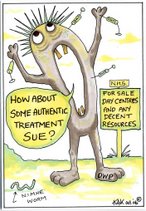
By Art De Rivers NowPublic.com UserWatch Correspondent
An Investigatory Round Up
An Investigatory Round Up
Parts of the UserWatch Team have been aware of a number of pieces of weaving information - some actually generated by User-experience of the so called lovely mental health NHS UK services which lately some people in Twitter mode or Twit-mode appear to be in love with, despite the need to criticise the hell out of the NHS so we all really do shape the services and their standards instead of them nailing peoples lives down sometimes into the ground . We guarantee you'll have your eyes opened by this report .
What struck us was the July 2009 report by the late HealthCare Commission inherited now by the Care Quality Commision which showed that a Trust in West London was at serious variance with its Strategic Health Authority (SHA) guidance on reporting and investigating Serious Untoward Incidents . We are talking about incidents like Suicide, Attempted Suicide, and others:
What struck us was the July 2009 report by the late HealthCare Commission inherited now by the Care Quality Commision which showed that a Trust in West London was at serious variance with its Strategic Health Authority (SHA) guidance on reporting and investigating Serious Untoward Incidents . We are talking about incidents like Suicide, Attempted Suicide, and others:
Page 17 of that report : (CIR = Critical Incident Review)
"Although many of the staff that we interviewed knew there was a distinction between a serious untoward incident investigation and a critical incident review, some were unable to tell us the difference. Some said that a critical incident review was more serious than a serious untoward incident investigation, “a CIR was for critical use on the ward” or a “CIR involved serious injury and an SUI did not involve serious injury to anyone”.
Others said that it was related to the severity of the incident. Some staff told us that the information in the reports generated 24 and 72 hours after an incident, as demanded by the policies, determined the level of review, or that the decision was made by the head of the service in which the incident occurred."
Others said that it was related to the severity of the incident. Some staff told us that the information in the reports generated 24 and 72 hours after an incident, as demanded by the policies, determined the level of review, or that the decision was made by the head of the service in which the incident occurred."
You might think that SHA's across the UK had standardised definitions of Serious Untoward Incidents think again - there has almost been a soft conspiracy of sloppiness that favours Trusts reputational risk thinking more than patient safety . Patient's come last sometimes and Trust paranoia first . You think we are being unfair ?
Read the Parliamentary Patient Safety Committee report Published on 3rd July 2009 which also merged its concerns with the way Commissioning Primary Care Trusts were not performance managing the contracts they set up with NHS Trusts :
"Commissioning, performance management and regulation
A key role for Primary Care Trusts (PCTs) in commissioning services is to ensure the quality and safety of those services. We have grave doubts as to whether all PCTs are actually doing so.
We welcome the principle of linking payment by PCTs to the quality of care, but recommend that it be piloted first. We support the use of “Never Events” by PCTs, but have doubts about whether they should involve a financial penalty; we recommend this be piloted too.
The performance-management role of Strategic Health Authorities (SHAs) appears to be ill-defined and to vary between SHAs. We recommend that the DH produce a formal definition of this role.
Regulation has been costly and burdensome. It has been too rule-based, looking at processes and procedures rather than actual outcomes and consequences and professional competence. Consequently, the Annual Health Check has failed to pick up major failings in some cases. The Care Quality Commission’s registration system must focus on the outcomes being achieved by NHS organisations rather than formal governance processes.
The relationship between bodies responsible for commissioning from, performance managing and regulating NHS service providers is not defined clearly enough.
In particular, there is a lack of clarity about the role of Monitor. The DH should produce a
succinct statement regarding how commissioning, performance management and
regulation are defined, and how they (and the organisations responsible for them) relate to
each other.
The role of managers and Boards
There is disturbing evidence of catastrophic failure on the part of some senior managers
and Boards in cases such as Mid-Staffordshire NHS Foundation Trust. While other Boards
are not failing as comprehensively, there is substantial room for improvement. Boards too
often believe that they are discharging their responsibilities in respect of patient safety by
addressing governance and regulatory processes, when they should actually be promoting
tangible improvements in services.
There is a case for providing specialist training in patient safety issues, particularly to non-executive directors, to help them scrutinise and hold to account their executive colleagues. Patient safety must be the top priority of Boards and, to show this, it should without exception be the first item on every agenda of every Board.
We commend to NHS organisations the measures piloted as part of the Safer Patients
Initiative, namely:
• implementing tried and tested changes in clinical practice to ensure safe care;
• banishing the blame culture;
• providing the leadership to harness the enthusiasm of staff to improve safety;
• changing the way they identify risks and measure performance, by using
information about actual harm done to patients, such as data from sample case
note reviews.
We strongly endorse the DH’s view that no Board in the NHS should always be meeting
behind closed doors and we urge the Government to legislate as necessary to ensure that
Foundation Trust Boards meet regularly in public. "
UserWatch was passed information agreed with by a Strategic Health Authority and the Bedford and Luton Mental Health Partnership Trust however that shows "reputational risk" still appears to be rated on the page rather higher than patient safety - so still the message-air is going out to protect the Trust's-smell first ... Page 9 from BLMHPT's 2009 Document, Policy and Procdeures of SUI reporting and Adverse Incidents leads more boldly with :
"Serious Untoward Incident
5.2.1
The Trust adopts the definition of a Serious Untoward Incident as set out by the NHSLA as ‘a situation in which one or more service users are involved in an event which is likely to produce significant legal, media or other interest and which if not properly managed may result in loss of the Trusts reputation or assets’."
Although this Trust does go on to try to define categories of SUI's there is almost too much emphasis placed on "Trust Reputation" and thus a fertile ground for the construction of a defensive mind set is created .
The first priority must be Patient Safety and health but in reality its often been Trust performance paranoia and protection of an image.
.

.jpg)







No comments:
Post a Comment